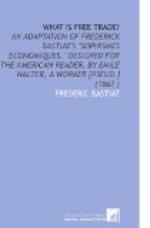We are surprised that men who call themselves peculiarly practical, reason independent of all practice.
In practice, is there one exchange in a hundred, in a thousand, in ten thousand perhaps, where there is a direct barter of product for product? Since there has been money in the world, has any cultivator ever said, “I wish to buy shoes, hats, advice, instruction, from that shoemaker, hatter, lawyer, and professor only, who will purchase from me just wheat enough to make an equivalent value?”
And why should nations impose such a restraint upon themselves?
How is the matter managed?
Suppose a nation deprived of exterior relations. A man has produced wheat. He throws it into the widest national circulation he can find for it, and receives in exchange, what? Some dollars; that is to say bills, bonds, infinitely divisible, by means of which it becomes lawful for him to withdraw from national circulation, whenever he thinks it advisable, and by just agreement, such articles as he may need or wish. In fine, at the end of the operation he will have withdrawn from the mass the exact equivalent of what he threw into it, and in value his consumption will precisely equal his production.
If the foreign exchanges of that nation are free, it is no longer into national, but into general circulation that each one throws his products, and from which he draws his returns. He has not to inquire whether what he delivers up for general circulation is purchased by a fellow-countryman or a foreigner; whether the goods he receives came to him from a Frenchman or an Englishman; whether the objects for which, in accordance with his needs, he, in the end, exchanges his bills, are made on this or that side of the Atlantic or the St. Lawrence. With each individual there is always an exact balance between what he puts into and what he draws out of the grand common reservoir; and if that is true of each individual, it is true of the nation in the aggregate. The only difference between the two cases is, that in the latter, each one is in a more extended market for both his sales and his purchases, and has consequently more chances of doing well by both.
This objection is made: “If every one should agree that they would not withdraw from circulation any of the products of a specified individual, he in turn would sustain the misfortune of being able to draw nothing out. The same of a nation.”
ANSWER.—If the nation cannot draw out of the mass, it will no longer contribute to it: it will work for itself. It will be compelled to that which you would impose on it in advance: that is to say, isolation.
And this will be the ideal of prohibitive government. Is it not amusing that you inflict upon it, at once and already, the misfortune of this system, in the fear that it runs the risk of getting there some day without you?




